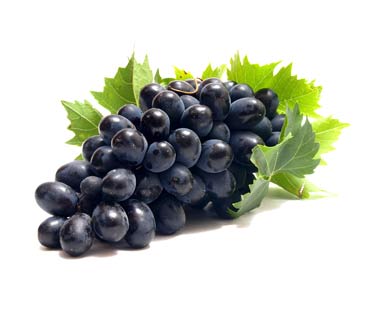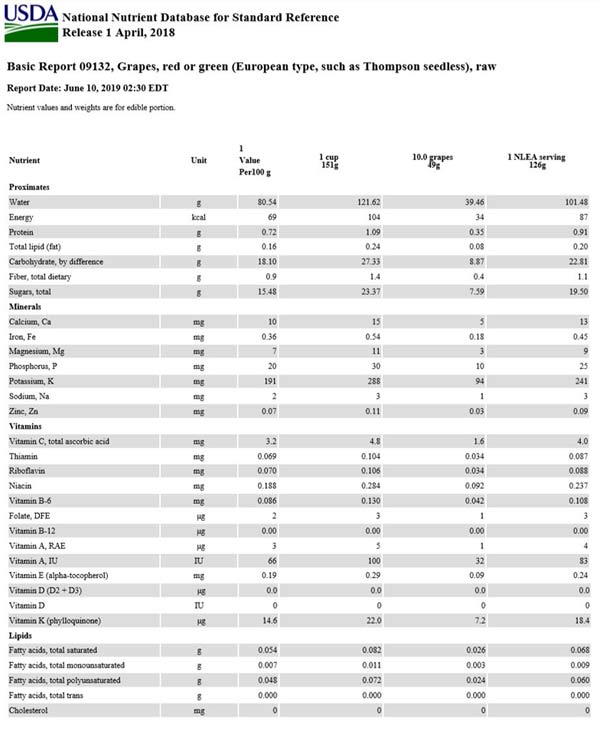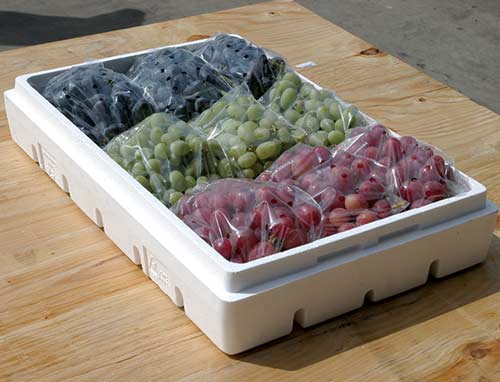
Grape
A grape is a fruit, botanically a berry, of the deciduous woody vines of the flowering plant genus Vitis.
Grapes can be eaten fresh as table grapes or they can be used for making wine, jam, juice, jelly, grape seed extract, raisins, vinegar, and seed oil. Grapes are a non-climacteric type of fruit, generally occurring in clusters.
Grapes have been cultivated domestically for thousands of years, a trade that started in the Middle East in areas including Cyprus, Egypt, Iran and Turkey.
There are many types of grapes including green, red, black, yellow and pink. They grow in clusters and come in seeded and seedless varieties.
- Grapes are dividing into 2 major groups (table grapes & wine grapes).
- Table grapes dividing into (seeded grapes & seedless grapes)
- Table Grapes are characterized by different color, shape, size, Brix, and acidity according to the variety

Iranian Grapes
Iran is among the top grape producing countries of the world which produces more than 3 million tons of grapes annually and also exports its finest products to more than 70 countries of the world. There are also a lot of high quality Iranian grape varieties that are available for sale internationally.
Iranian grape varieties
Grapes are probably one of the oldest and best known of the cultivated fruit plants grown in Iran and the Middle Eastern countries. Iran is one of the countries that grow grapes for commercial purposes. There are some important types of local business features available.
Cultivars like ASGARI, KESHMESHI, SHAHROUDI, and KHALILI have shown a lot of potential and have a high yield rate. KESHMESHI and ASGARI are the most important Iranian grape seeds and are consumed as freshly harvested fresh herbs and raisins.
Almost these entire numerous Iranian grape varieties are exported available in international markets.
Green or Red Seedless grape
Red and Green seedless grapes are small to medium in size and are round to slightly oblong in shape. The color of a grape can vary widely depending on the conditions of variety and local growth conditions. But it’s usually a deeper color than light. Their skin is also thin.
These conditions made red and green seedless grapes very popular all around the world and a lot of big companies and websites offer them among their products.
Persian ASGARI grape
The Persian ASGARI grapes are small, round, yellow and sweet and juicy. These delicious grapes are also seedless and are great for low chill, mild winter climates. These grapes are best enjoyed fresh and have a lot of other usages as well.
Some people also dry them to make raisins, or use their big green leaves to make the Persian dish of DOLMEH. This amazing specie is only one of many Iranian grape varieties, and is sent to both local and international markets.
Our ranking in the world
Iran with 1.9M tons of production (3.1% of worldwide production) is the 12th in the producers ranking and with the 1.2% of export share is located in 19th ranking of exporters.


Main production places
The grape is growing and cultivating in many different places around country. There are 290,000 hectares of vineyards in the country. The most important areas those are famous in grape cultivating are KURDISTAN, QAZVIN, NORTH KHORASAN as well as East and West AZERBAIJAN provinces. Grapes are one of the main fruits exported by Iran. Iranian grape varieties exported to more than 70 countries of the world in both fresh and dried form.
Nutritional value and Benefits
Grapes offer a wealth of health benefits due to their high nutrient and antioxidant contents.
Here are the top health benefits of eating grapes.
Antioxidants are compounds found in plants, for example. They help repair the damage to your cells caused by free radicals, which are harmful molecules that cause oxidative stress.
Oxidative stress has been associated with several chronic diseases including diabetes, cancer and heart disease.
Grapes are high in a number of powerful antioxidant compounds. In fact, over 1,600 beneficial plant compounds have been identified in this fruit.
The highest concentration of antioxidants is found in the skin and seeds. For this reason, most of the research on grapes has been done using seed or skin extracts.
Red grapes contain higher numbers of antioxidants due to the anthocyanins that give them their color.
The antioxidants in grapes remain present even after fermentation, which is why red wine is also high in these compounds.
One of the antioxidants in this fruit is resveratrol, which is classified as a polyphenol.
Numerous studies have been performed on its benefits, showing that resveratrol protects against heart disease, lowers blood sugar and protects against the development of cancer.
Grapes also contain vitamin C, beta-carotene, Quercetin, Lutein, Lycopene and Ellagic acid, which are powerful antioxidants as well.
Summary Grapes are high in antioxidants, beneficial plant compounds that may protect against chronic health conditions, such as diabetes, cancer and heart disease.
Grapes contain high levels of beneficial plant compounds, which may help protect against certain types of cancer.
Resveratrol, one of the compounds found in this fruit, has been well-studied in terms of cancer prevention and treatment.
It has been shown to protect against cancer by reducing inflammation, acting as an antioxidant and blocking the growth and spread of cancer cells within the body.
However, the unique combination of plant compounds found in grapes may be responsible for their anti-cancer benefits. In addition to Resveratrol, grapes also contain Quercetin, Anthocyanins and Catechins — all of which may have beneficial effects against cancer.
Grape extracts have been shown to block the growth and spread of human colon cancer cells in test-tube studies.
Additionally, one study in 30 people over the age of 50 showed that eating 1 pound (450 grams) of grapes per day for two weeks decreased markers of colon cancer risk.
Studies have also found that grape extracts block the growth and spread of breast cancer cells, both in laboratory and mouse models.
While studies on grapes and cancer in humans are limited, a diet high in antioxidant-rich foods, such as grapes, has been linked to a lower risk of cancer.
Summary Grapes contain many beneficial plant compounds, such as Resveratrol, that may protect against various types of cancer, including colon cancer and breast cancer.
There are several reasons why eating grapes is good for your heart.
May Help Lower Blood Pressure
One cup (151 grams) of grapes contains 288 mg of potassium, which is 6% of the RDI.This mineral is necessary for maintaining healthy blood pressure levels. Low intake of potassium has been linked to increased risks of high blood pressure, heart disease and stroke.
A study in 12,267 adults showed that people who consumed higher levels of potassium in relation to sodium were less likely to die from heart diseases than those who consumed less potassium.
May Help Reduce Cholesterol
Compounds found in grapes may help protect against high cholesterol levels by decreasing cholesterol absorption.In one study in 69 people with high cholesterol, eating three cups (500 grams) of red grapes a day for eight weeks was shown to lower total and “bad” LDL cholesterol. White grapes did not have the same effect.
Additionally, diets high in Resveratrol, such as the Mediterranean diet, have been shown to decrease cholesterol levels as well.
Summary Compounds in grapes and red wine may protect against heart disease. Grapes may help lower blood pressure and cholesterol.
Grapes contain 23 grams of sugar per cup (151 grams), which may make you wonder if they’re a good choice for people with diabetes.
They have a low Glycemic index (GI) of 53, a measure of how quickly a food raises blood sugar.
Furthermore, compounds found in grapes may even decrease blood sugar levels. In a 16-week study in 38 men, those who took 20 grams of grape extract per day experienced decreased blood sugar levels, compared to a control group.
Additionally, Resveratrol has been shown to increase insulin sensitivity, which may improve your body’s ability to use glucose and hence lower blood sugar levels.
Resveratrol also increases the number of glucose receptors on cell membranes, which may have a beneficial effect on blood sugar.
Managing your blood sugar levels over time is an important factor in reducing your risk of diabetes.
Summary Though grapes are high in sugar, they have a low Glycemic index. Additionally, compounds in grapes may protect against high blood sugar.
The plant chemicals found in grapes may protect against common eye diseases.
In one study, mice fed a diet supplemented with grapes showed fewer signs of damage to the retina and had better retinal function compared with mice who were not fed the fruit.
In a test-tube study, Resveratrol was found to protect retinal cells in the human eye from ultraviolet A light. This may lower the risk of developing age-related macular degeneration (AMD), a common eye disease.
According to a review study, Resveratrol may also help protect against glaucoma, cataract and diabetic eye disease.
Additionally, grapes contain the antioxidants Lutein and Zeaxanthin. Several studies have demonstrated that these compounds help protect the eyes from damage from blue light.
Summary Grapes contain several compounds, such as Resveratrol, Lutein and Zeaxanthin, that may protect against common eye diseases, including age-related macular degeneration, cataracts and glaucoma.
Eating grapes may benefit your brain health and boost your memory.
In a 12- week study in 111 healthy older adults, 250 mg of a grape supplement per day significantly improved scores on a cognitive test measuring attention, memory and language compared to baseline values.
Another study in healthy young adults showed that drinking about 8 ounces (230 ml) of grape juice improved both the speed of memory-related skills and mood 20 minutes after consumption.
Studies in rats have shown that Resveratrol improved learning, memory and mood when taken for 4 weeks.
Additionally, the rats’ brains showed signs of increased growth and blood flow.
Resveratrol may also help protect against Alzheimer’s disease, though studies in humans are needed to confirm this.
Summary Grapes contain compounds that may improve memory, attention and mood and may protect against Alzheimer’s disease, though more human-based research is needed to confirm some of these benefits.
Grapes contain many minerals necessary for bone health, including calcium, magnesium, potassium, phosphorus, manganese and vitamin K.
Though studies in rats have shown that Resveratrol improved bone density, these results have not been confirmed in humans.
In one study, rats fed freeze-dried grape powder for 8 weeks had better bone absorption and retention of calcium versus rats that did not receive the powder.
Human-based studies on the effect of grapes on bone health are currently lacking.
Summary Grapes contain many nutrients important for bone health, including calcium, magnesium, phosphorus and vitamin K. Studies in rats have shown that grapes may have protective effects on bones, but human studies are needed to confirm these benefits.
Numerous compounds in grapes have been shown to protect against and fight bacterial and viral infections.
Grapes are a good source of vitamin C, which is well known for its beneficial impact on your immune system.
Grape skin extract has been shown to protect against the flu virus in test-tube studies.
Additionally, compounds in grapes stopped the herpes virus, chicken pox and yeast infections from spreading in test-tube studies.
Resveratrol may also protect against food borne illnesses. When added to different types of food, it was shown to prevent the growth of harmful bacteria, such as E. coli.
Summary Grapes contain several compounds that have shown beneficial effects against certain bacteria, viruses and yeast infections.
Plant compounds found in grapes may affect aging and lifespan.
Resveratrol has been shown to lengthen lifespan in a variety of animal species.
This compound stimulates a family of proteins called Sirtuins, which have been linked to longevity.
One of the genes that Resveratrol activates is the SirT1 gene. This is the same gene activated by low-calorie diets, which has been linked to longer lifespans in animal studies.
Resveratrol also affects several other genes associated with aging and longevity.
Summary Resveratrol in grapes has been shown to activate genes associated with slower aging and longer lifespan.
Chronic inflammation plays a key role in the development of chronic diseases, such as cancer, heart disease, diabetes, arthritis and autoimmune diseases, to name just a few.
Resveratrol has been linked to powerful anti-inflammatory properties.
In a study in 24 men with metabolic syndrome — a risk factor for heart disease — a grape powder extract equivalent to approximately 1.5 cups (252 grams) of fresh grapes increased the number of anti-inflammatory compounds in their blood.
Similarly, another study in 75 people with heart disease found that taking grape powder extract increased levels of anti-inflammatory compounds, compared to a control group.
A study in rats with inflammatory bowel disease showed that grape juice improved not only signs of the disease but also increased blood levels of anti-inflammatory compounds.
Summary Grapes contain compounds that may have anti-inflammatory effects, which may protect against certain heart and bowel diseases.
Grapes are easy to incorporate into a healthy diet. Here are a few ways you can enjoy them:
• Eat grapes plain as a snack.
• Freeze grapes for a cool treat.
• Add chopped grapes to a vegetable or chicken salad.
• Use grapes in a fruit salad.
• Add grapes or grape juice to a smoothie.
• Add grapes to a cheese board for an appetizer or dessert.
• Drink 100% grape juice.
Summary Grapes are delicious and easy to add to your diet for breakfast, lunch, dinner or simply as a convenient, healthy snack.

Grapes contain several important nutrients and powerful plant compounds that benefit your health.
Though they contain sugar, they have a low Glycemic index and don’t appear to raise blood sugar levels.
Antioxidants in grapes, such as Resveratrol, reduce inflammation and may help protect against cancer, heart disease and diabetes.
Grapes are easy to incorporate into your diet, whether fresh, frozen, as juice or wine.
For the most benefits, choose fresh, red over white grapes.
Packaging and Shipping
The Smile Fresh Fruit Company is packaging and exporting grapes of exceptional quality and great taste all through Iran. Our packing system for grapes converges to the optimum point of parameters:
•Ventilating each fruit’s peel entirely
•Decreasing the weight by keeping the strength
•Accessibility for Forklift and hand-jack from all sides
•Implementing recyclable and biodegradable materials
•Securing fruits from degradation due to one point contact
•Cross ventilating of the boxes and the pallets in a uniform temperature
•Use of Hygiene used materials pure from any unwanted contamination

As a part of belief in environmental friendly practice, EDMANFRUIT’s boxes and pallets are made from recyclable and fast biodegradable materials. These boxes are light but solid with high stacking load tolerance (500 kg) which is surely tick their service condition in our packing system Grapes are put mainly in three types of packages: Carton or Plastic boxes up to 8 kg of weight, prepared for free sale service, and small 1 kg polyethylene transparent packages.
